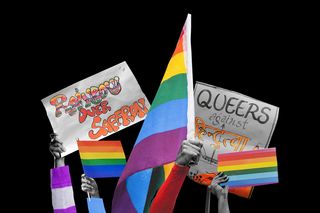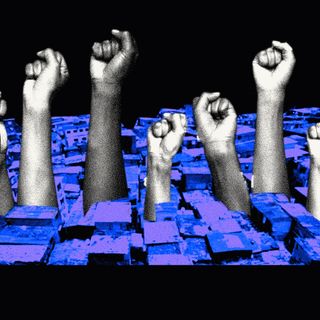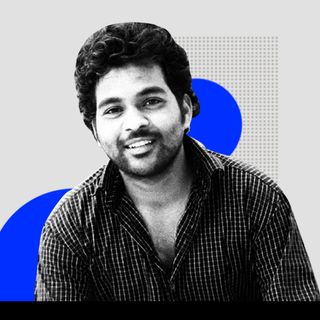
Mumbai Pride Says No Political Posters Allowed — But Queerness Is Political
The debate over the appointment of an openly gay advocate as a high court judge shows how pride — and queerness — is inherently political.

This week, queer Indians on Twitter strongly criticized the organizers of an upcoming pride parade in Mumbai. It stemmed from screenshots of Instagram stories posted by a Twitter user, which highlighted the organizers’ message to their followers discouraging them from bringing “political posters” to the parade. Color Positive, the Mumbai-based NGO that is organizing the parade, indicated through the stories that political posters were irrelevant to the event, going on to ask their followers to refrain from bringing posters that displayed “hateful messages.” Speaking to The Print, Savio Mascarenhas, the founder of Color Positive Foundation, said that they wanted people to focus only on issues “relevant” to the LGBTQIA+ community at the event.
But the apolitical positioning of queer issues goes against the inherently political nature of queerness. Take the ongoing debate around an openly gay advocate, Saurabh Kirpal. The Supreme Court Collegium on Thursday upheld its recommendation for appointing Kirpal as a judge in the Delhi High Court. This was after the Law Ministry’s objection to Kirpal’s appointment: the Ministry stated that Kirpal’s “ardent involvement and passionate attachment to the cause of gay-rights” would not rule out the possibility of bias and prejudice.” The collegium’s recommendation had been opposed by the government earlier too, on the grounds that Kirpal’s partner was a Swiss national, a fact that the government felt could compromise the country’s national security. The appointment of Kirpal — pending for the last five years — comes weeks ahead of the Supreme Court’s hearings of petitions on legalizing same-sex marriages in the country, scheduled for March this year.
The Transgender Persons (Protection of Rights) Act 2019, widely criticized as transphobic, is yet another instance of queerness being political, as is the government’s opposition to legalizing same-sex marriage. These indicate how politics play an integral role in shaping the lived realities of queer communities — still, organizers of pride parades across the country remain insistent on keeping their walks apolitical.
This is not the first time that the organizers of a pride parade have discouraged people from voicing their political opinions at a walk. In early 2020, Queer Azadi Mumbai, the organizers of the city’s oldest pride parade, requested participants to keep sloganeering limited to issues “pertaining to the interests of the LGBTQIA+ community.” When slogans raised in support of jailed activist Sharjeel Imam attracted sedition charges against 50 attendees of the event, the organizers promptly released a statement distancing themselves from the act, noting that the slogans were “irresponsible аnd potentially detrimental.” In other cities of the country too, pride organizers have often requested participants to maintain an apolitical stance, and to stick to issues of the queer community, deeming other issues irrelevant. Further, in several recent occasions, pride parade organizers have also been accused of being casteist, and of not doing enough to make pride marches and queer collectives a safe space for queer individuals from marginalized castes.
Related on The Swaddle:
Corporate Investment in Pride Increases Visibility, But Doesn’t Expand Rights
These incidents highlight how pride parades — and queer rights — have often been imagined in the country as issues isolated from other day-to-day political developments in the country. The demand for equal rights and dignity for queer people is often posited as an individual, or at best, a distinct societal issue. This discredits not only the role that political ideologies play in shaping the societal conditions that marginalize queer populations, but also the power that political action holds in changing existing conditions.
As the division over Kirpal’s appointment highlights, questions pertaining to queer rights and queer representation cannot be viewed in isolation from other political developments. The decision of the government to oppose Kirpal’s appointment on the grounds that “he is in an intimate relationship and is open about his sexual orientation” indicates a strong prejudice against Kirpal simply because of his sexual orientation. It highlights a fear that his appointment would suggest that it is okay for a person occupying such a high rank in public office to be gay, disrupting the cis-heteronormative, patriarchal status quo.
Similarly, the collegium maintaining that Kirpal being open about his sexual orientation “goes to his credit”, and holding that not appointing him would go against constitutional practices, is just as political — and thereby, valuable. It directly ties queer rights to constitutional values — and thus rooted in the political fight for queer rights as fundamental rights.
Moreover, the roots of Pride lie in protests against police raids in Stonewall Inn, an underground gay bar in New York’s Greenwich Village. Pride, then, is inherently a political event. Pride organizers in India endorsing the idea that queer issues can be separated from larger political events in the country, then, does a disservice to pride and all that it stands for.
Amlan Sarkar is a staff writer at TheSwaddle. He writes about the intersection between pop culture and politics. You can reach him on Instagram @amlansarkr.
Related


Why Are Dharavi’s Residents Protesting Adani’s Redevelopment Plan?
